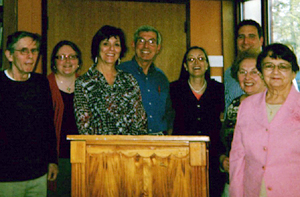 |
|||
|
Worcester Hellenic Arts Society Prepared for Ellis Island Visit with Hellenic Genealogy Lecture |
|||
|
|||
| Papoutsy offered a 90-minute presentation, combining power-point imagery and lecturing. She drew upon more than a decade of experience in researching Hellenic ancestry for hundreds of individuals both in the U.S. and in Greece. The free, online database of passenger ship records on the SOLEIF website, she explained, is a valuable resource for Greek-Americans. With information from this source, one can begin to expand one's family history research to include investigations abroad. It is the single most helpful site on the Internet for people of Greek descent and its use is entirely free, she elaborated (http://www.ellisislandfoundation.org). |
|||
Images of actual hand-written ship manifests supplied interesting illustrative materials for the group. Papoutsy used the example of a Constantinopolitan widow immigrating to the U.S. with her four small children to demonstrate the features of the database. Attendees learned about the original creation of the ship manifests, how their transcription affected searching the database, and how to develop multiple spelling variations of Greek surnames for best use of the site. Papoutsy urged attendees to "start with what you know," a basic tenet of all genealogical research, and to "move back in time," to their immigrant ancestors and beyond, as they begin to record their research findings. She briefly demonstrated how to "start with what you know" by filling in information about oneself and one's parents and grandparents on a simple fan chart. The next steps, Papoutsy indicated, were to widen their search to consult other U.S. sources, including city directories, census data, naturalization records, and finally, Orthodox parish records. |
 Worcester Hellenic Arts Society genealogy lecture participants: (L-R) George Manos, Margaret Felis, Irene Savas, Athan Savas, Mary Papoutsy, Geroge Maniatis, Bessie Capsalis. Lukia Bitzas, |
||
|
Armed with a Greek spelling of their family name and their ancestral village, the immediate goals of their U.S. searches, investigators then can begin their search abroad. Civil records at local villages and municipalities, along with ecclesiastical holdings at governing metropolises can greatly expand researchers' collection of data. Papoutsy showed examples of actual documents obtained from abroad, explaining their significance and where to locate them. But one of the best sources of information, she revealed, were village elders, some of whom have encyclopedic-style recall of local family histories. |
|||
The enthusiastic Worcester group jotted notes and asked thoughtful questions of the presenter. After the session, President Bitzas, representing the Worcester group, presented Mrs. Papoutsy with lovely orchids as a token of their appreciation, and welcomed everyone to a reception of light refreshments.During the reception Mrs. Papoutsy and her husband, Chris, chatted informally with participants about genealogy and the group's upcoming trip to the national park in New York. |
|
||
|
(Posting date 17 May 2011) HCS encourages readers to view other articles and releases in our permanent, extensive archives at the URL http://www.helleniccomserve.com/contents.html. |
|||
|
|||
|
2000 © Hellenic Communication Service, L.L.C. All Rights Reserved.
http://www.HellenicComServe.com |
|||

